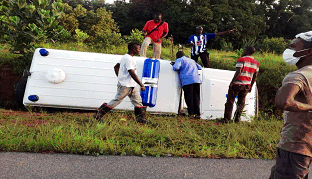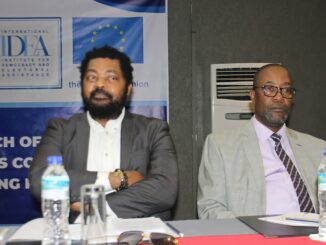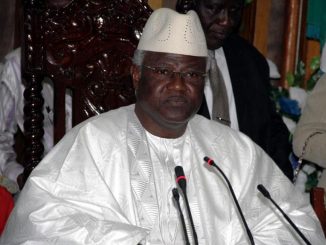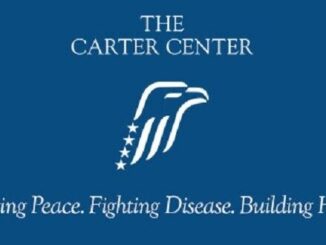
An ambulance carrying suspected Ebola patients has summersaulted onto a ditch on the Port Loko highway. According to Abu Bakr Kamara” who witnessed the scene this morning, the ambulance was carrying suspected Ebola patients from a place called Lokomasama in the Port Loko district when angry youths chased and pelted stones at the vehicle. The driver apparently panicked and lost control. Abubakr said the youths were trying to prevent their loved ones from being taken away because they didn’t believe that they were infected with Ebola. He also confirmed that the suspected patients survived the accident unscathed and have been rescued after the military were called in.
Observers say, denial and strong belief in witchcraft has been hindering the fight against the spread of the Ebola virus in some parts of the Port Loko district. Some of the early reports of Ebola cases in that district were dismissed by a good number, including a few senior citizens of Port Loko, who attributed the strange symptoms and terminal manifestations of the disease to the consequence of a ‘witch plane crash’. Bizarre as this may sound to the scientific mind, reports say, some people in Port Loko, like many in other parts of the country, preferred the parochial services of herbalists which usually leads to a rather sudden exponential increase in new infections. This is because herbalists cannot cure Ebola and when their clients die, they give other reasons as cause of them; allowing for community burials which the Chief Medical Officer has described as the “the predominant cause of new infections”. As 25th October 2014, there were a total 486 confirmed cases in the Port Loko, the third highest in the whole country.
This ugly situation underpins the need for a treatment center in that district. Yesterday, at the opening of the first such centers, a 100 bed facility, President Koroma was reported to have been very stern in expressing his disappointment with the local authorities there. Reports say that the president blamed them and other local authorities in other districts for not doing enough to engage the communities with the right messages and to enforce the regulations under the state of emergency. A terse statement from the State House Communications Unit states:
“President Ernest Bai Koroma has issued stern warning to traditional and religious leaders in Port Loko, Bombali and Tonkolili to ensure a drastic reduction in the number of new cases in their chiefdoms and areas of operations…”
These three districts are all in the north were the number of new cases has been spiking. But Port Loko, which shares borders with those other two districts, is less than an hour’s drive away from the Western area. Therefore many people are concerned that despite the district has been quarantined, its people, many of whom are businessmen, travel frequently to the Western Area especially Waterloo (Western Rural), and Freetown (Western urban) both of which have the highest number of new infections. Analysts say, until the measures under the emergency are effectively enforced and until the people, generally, fully appreciate the risks associated with such superstition and denial, the fight against the spread of this deadly virus may continue to be very difficult.
Apart from denial and superstition, the spate of sporadic disorder appears to be rather too frequent. Back in May, during the early days of the outbreak, health facilities and workers in Kailahun and Kenema, the then epicenters, faced a lot of hostilities from angry members of the public. There were also intermittent public disorder which warranted police and sometimes military intervention. This threat to the peace has also manifested in other parts of the country. Recently in Kono, Eastern Sierra Leone, agitated youths took to the streets in protest against the taking away of an 80 year old suspected Ebola patient. The ring leader of the protest, Amadu, claimed that his sister had been taken several weeks earlier but died because she did not receive proper medical care. Amadu claimed that there is no treatment center in the whole of Kono and so he didn’t see any reason for his old mom to be taken away only to be left waiting for an ambulance to convey her several miles away on a rough road. Amadu was roundly condemned across the country for his bellicose behavior but the fact that there were people ready to confront the police and even the military on his behalf draws attention to the reality that there are many more people who still do not trust the system and/or believe in the mantra of “Ebola is real”.
In Freetown, there have been several such public disorders; whether it’s a protest over the collection of sick or dead bodies… These (isolated) riotous incidences in a post-conflict country like Sierra Leone send a powerful message that this calamitous Ebola virus outbreak may very well threaten the hard – won peace and security of this country.
President Koroma appears to be fully aware of this potent threat. In addition to declaring a State of Emergency and quarantining several districts and communities, he has also ‘reconfigured’ the Emergency Operations Center to the National Ebola Response Center (NERC) and detailed his Deputy Defense Minister to coordinate its activities. The president also moved the NERC offices from the WHO premises to a government owned building. These two recent actions, analysts say, are a clear indication that the president wants some military type discipline and that he is taking full charge the fight against this scourge. President Koroma is not alone in that thinking of a military style approach. The British, who were instrumental in ending the country’s’ 11 year brutal conflict; have come in muscularly, with mostly military medics. They are building holding and treatment centers, flying in laboratory equipment and providing technical expertise.
Umaru Fofana, publisher of the Politico newspaper, said in an article that the British are on the right track. Fofanah, urged the United Nations, the World Health Organization (WHO) in particular, whose handling of the outbreak he bemoans, to borrow a leaf from the British if their actions were to make any meaningful impact.
Many people believe that the situation in Sierra Leone is complicated. From a weak health infrastructure to an unenlightened public, ‘botched WHO response’ and a very slow international reaction, what is needed now is less bureaucracy, more coordination and a robust and constructive intervention. It is expected that the newly established United Nations Emergency Ebola Response Mission (UNMEER) may be the panacea but observers say, the UN mission is still finding its footing.
Sheriff Mahmud Ismail




Leave a Reply